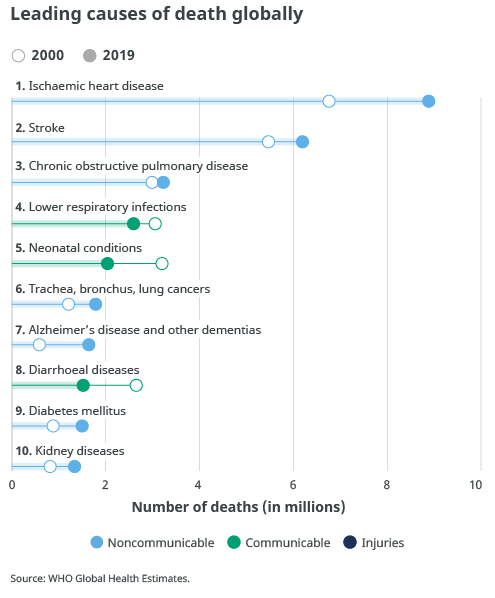
News
You hold the key – Take charge of your kidney health today
Kidney health stands as a cornerstone of our overall well-being, yet its importance often remains underestimated. The kidneys, crucial organs in our body, are responsible for filtering waste and excess fluids from the blood, regulating electrolyte levels, and maintaining blood pressure. However, kidney disease ranks among the top 10 causes of death in the world, according to the World Health Organisation.
As we commemorate World Kidney Day on 14 March, the Western Cape Department of Health and Wellness joins global awareness efforts aimed at educating and empowering people with informatioin about the importance of kidney health, promoting early detection and healthy lifestyle choices.
“According to a report shared by the World Health Organisation in 2020, kidney diseases have risen from the world’s 13th leading cause of death to the 10th in 2019," says Dr L'oreal Snyders, from the Symphony Way Community Day Centre in Delft, Cape Town.
"This underscores the critical need for all of us to prioritise kidney health in our overall wellness journey. It is essential to prioritise our kidney health because when kidneys do not function, waste builds up in our body and that can lead to serious health problems, like kidney failure. This is life-threatening. Many illnesses like hypertension, diabetes and HIV can affect our kidneys if we do not control these diseases. The good news is that there are things that you can do to take care of your kidneys.
How to protect your kidney health
There are many causes of kidney disease that we can prevent, however, there are causes that can be inherited. This means you may be more likely to get kidney disease if you have a close relative with kidney disease. Chronic diseases can also play a role in your kidney health. This is why a healthy lifestyle is so important for all people.
“Uncontrolled hypertension and uncontrolled diabetes can directly damage the kidneys by damaging the small blood vessels in kidneys,” says Dr Snyders. “This damage can progress to chronic kidney disease and eventually end-stage renal disease if left untreated. This will require dialysis. The last treatment is a kidney transplant. To mitigate the risks of kidney damage associated with hypertension and diabetes, individuals can take several steps in their day-to-day lives by controlling blood pressure and blood sugar levels, which can be achieved through a combination of medication, diet, exercise and regular monitoring of blood pressure and blood sugar levels.
Many lifestyle factors can affect your kidney health, including unhealthy eating habits, sedentary lifestyles (not exercising), excessive alcohol consumption, and smoking.
To protect your kidney health, it’s important to start living a healthy lifestyle at home.
Dr Snyders shares tips for healthy kidneys. This includes:
Regular exercise: Aim to exercise for 40 minutes, 3 times a week. “This can be high impact exercise like walking, running. Or low impact exercise like swimming. Cardiovascular exercise will help blood flow and to reduce retention of fluid.” You could also join a community wellness class and invite your family or friends to join.
Eat a balanced diet: “A dietician should see most patients to tailor their diets according to their stage of the kidney disease,” says Dr Synders. Generally, a few points for day-to-day living include:
- “Reduce sodium intake by opting for fresh foods over packaged ones, preparing meals from scratch with herbs instead of salt, and rinsing canned items with water to remove excess salt.” The World Health Organisation recommends that adults consume less than 5 grams, or just under a teaspoon, of salt per day. For children aged two to 15 years, the recommended maximum salt intake should be adjusted based on their energy requirements relative to adults. Consult a healthcare professional for personalised advice.
- Eat small portions of protein foods. “Animal-protein foods include chicken, fish, meat, eggs and dairy. Plant-protein foods include beans, nuts and grains.”
- “Grill, boil or bake foods rather than frying in oil.”
- “Limit potassium and phosphorous rich foods like oranges, bananas, and orange juice, potatoes, tomatoes, brown and wild rice, bran cereals, dairy foods, whole-wheat bread and pasta, beans, and nuts.”
Stay hydrated: “We can protect our kidneys by drinking enough water (8 glasses a day or +- 1,5L a day).”
Avoid excessive alcohol consumption and smoking: “Habits such as smoking tobacco products or drinking alcohol can affect your kidney health.” Smoking can increase your risk for other diseases such as cancer while regular or heavy consumption of alcohol can affect your kidney functioning. You can access guidance from support groups in your community or your local clinic.
Take your medication as prescribed: “Medication adherence is essential for patients with chronic kidney disease or other kidney-related ailments,” says Dr Snyders. Proper management of these conditions often requires a combination of medications to:
- Control symptoms such as high blood pressure; proteinuria; body swelling and electrolyte imbalances.
- Slow the progression of the disease.
- Prevents complications, which include cardiovascular disease, bone disease, anemia, and infection. Therefore, proper adherence to the medications can help alleviate symptoms and improve the quality of life.
Signs and symptoms of kidney problems
Regular check-ups with a healthcare provider can also help monitor kidney function and detect any issues early. “Individuals should be seen by a health care provider for regular monitoring of kidney function through blood tests, urine tests and blood pressure checks. Especially if they have a family history of kidney disease,” says Dr Snyders.
The beginning of kidney disease can be asymptomatic which means no symptoms or signs are experienced. The latter phase of kidney disease may include the following:
- Changes in urine output: This can be decreased urine output, also blood in urine or difficulty urinating.
- Swelling in hands, feet, and ankles or around the eyes can be a sign of fluid retention.
- Fatigue and weakness: Kidney disease can lead to anemia which can cause fatigue and weakness.
- High blood pressure: Chronic kidney disease can lead to high blood pressure or worsen existing hypertension.
- Changes in appetite: Loss of appetite, nausea, vomiting and sometimes even a metallic taste in the mouth.
- Back pain can be due to kidney stones or kidney infections.
- Itchy skin: Kidney disease can cause skin to be dry and itchy.
- Muscle cramps can be caused by electrolyte imbalances.
- Sexual dysfunction.
- Thyroid disease.
Remember to seek support from your GP or local clinic if you have any concerns.
Beyond World Kidney Day
Dr Snyders believes that promoting kidney health awareness and advocacy beyond World Kidney Day is important in helping to educate and support people with kidney conditions, as well as raise awareness about the impact of kidney disease on public health. She has shared some ways that we can actively participate in promoting kidney health awareness:
• Stay informed: Know risk factors, ways to prevent kidney disease and how to manage kidney conditions.
• Support organisations like the NKFSA (National Kidney Foundation of South Africa). There are many organisations dedicated to kidney health advocacy and support for individuals with kidney disease. Consider volunteering your time; donating to these organisations or participating in fundraising events to support their important work.
• If you have a loved one with kidney disease, share your personal story, which can help raise awareness and inspire others to take action.
As we acknowledge the importance of kidney health in our overall well-being, let us collectively prioritise proactive measures to safeguard our kidneys and promote a healthier future for all!





